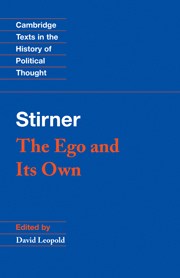Book contents
- Frontmatter
- Contents
- Acknowledgements
- Introduction
- Principal events in Stimer's life
- Further reading
- Note on the translation
- The Ego and Its Own
- First Part: MAN
- I A human life
- II Men of the old time and the new
- Second Part: I
- Biographical and other notes on the text
- Index of subjects
- Index of proper names
- Cambridge Texts in the History of Political Thought
II - Men of the old time and the new
Published online by Cambridge University Press: 05 June 2012
- Frontmatter
- Contents
- Acknowledgements
- Introduction
- Principal events in Stimer's life
- Further reading
- Note on the translation
- The Ego and Its Own
- First Part: MAN
- I A human life
- II Men of the old time and the new
- Second Part: I
- Biographical and other notes on the text
- Index of subjects
- Index of proper names
- Cambridge Texts in the History of Political Thought
Summary
How each of us developed himself, what he strove for, attained, or missed, what objects he formerly pursued and what plans and wishes his heart is now set on, what transformation his views have experienced, what perturbations his principles – in short, how he has today become what yesterday or years ago he was not – this he brings out again from his memory with more or less ease, and he feels with particular vividness what changes have taken place in himself when he has before his eyes the unrolling of another's life.
Let us therefore look into the activities our forefathers busied themselves with.
The ancients
Custom having once given the name of ‘the ancients’ to our pre-Christian ancestors, we will not throw it up against them that, in comparison with us experienced people, they ought properly to be called children, but will rather continue to honour them as our good old fathers. But how have they come to be antiquated, and who could displace them through his pretended newness?
We know, of course, the revolutionary innovator and disrespectful heir, who even took away the sanctity of the fathers' sabbath to hallow his Sunday, and interrupted the course of time to begin at himself with a new chronology; we know him, and know that it is – the Christian. But does he remain forever young, and is he today still the new man, or will he too be superseded, as he has superseded the ‘ancients’?
- Type
- Chapter
- Information
- Stirner: The Ego and its Own , pp. 19 - 136Publisher: Cambridge University PressPrint publication year: 1995



